Protein Coffee Recipe (14 Grams Protein)
This Protein Coffee recipe is a great way to start the day. It’s satisfying and helps increase your overall protein intake. You can’t even taste the collagen protein in this recipe that can be made with milk or dairy-free. This is an easy way to get an extra 14 grams of protein!
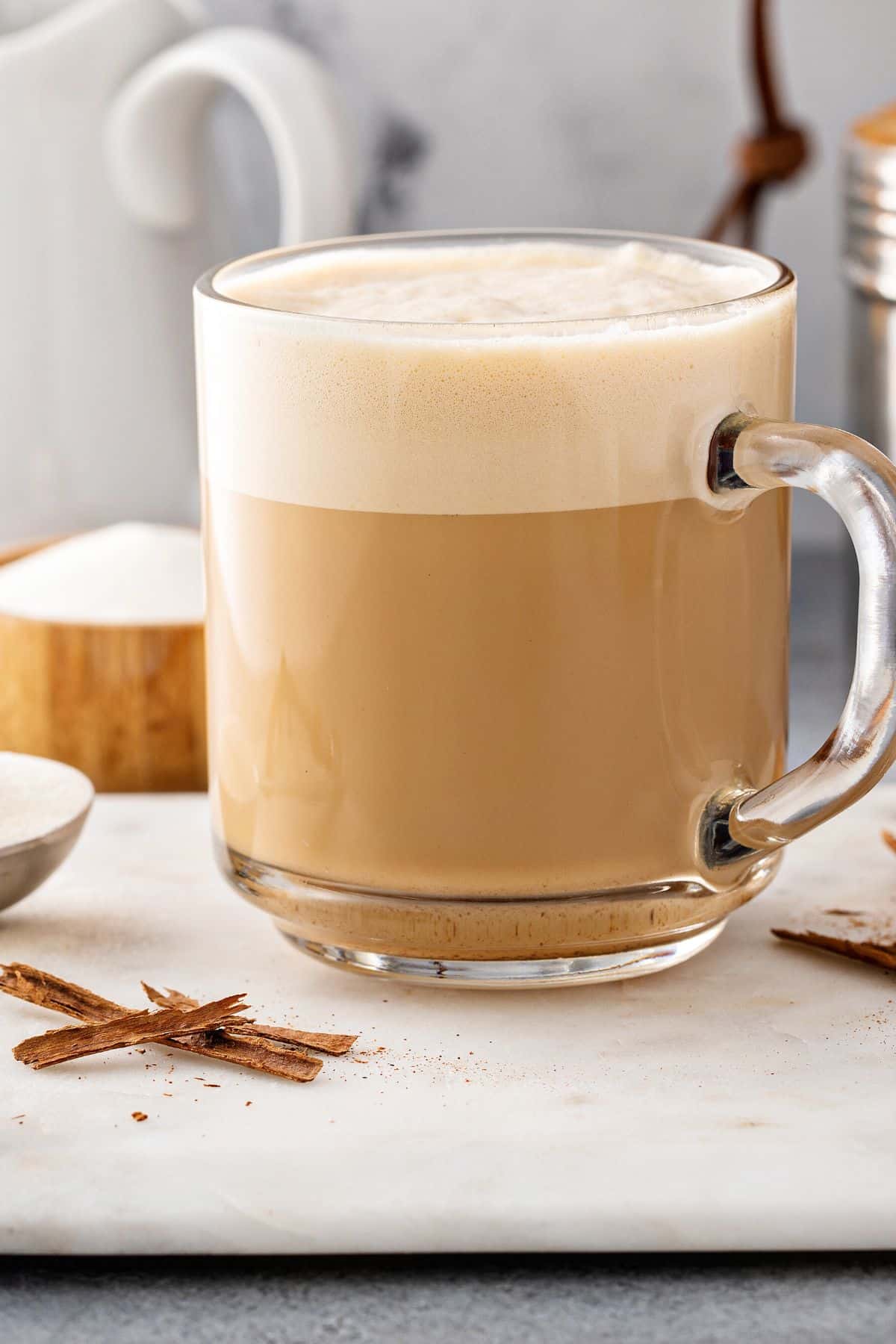
Whether you’re a mom, a busy worker bee, or you just love leading an active lifestyle, you could probably do with a little extra boost of energy and nutrition in the morning.
Good news! Coffee and protein are an energetic match made in heaven. Protein is the number one most filling macronutrient, so it helps you feel fuller for longer.
Coffee also has a surprisingly large range of potential health benefits. It’s packed with antioxidants and can help your body process glucose better, keep your liver enzymes more stable, and reduce your risk of Alzheimer’s disease.
With this recipe, you can get all the goodness of extra protein without the hassle of cooking anything. And it packs a healthy punch – it’s an easy way to get what you need to kickstart your day!
Why You Need This Recipe
- Protein coffee gives you a natural energy boost, but it’s also a filling snack in a mug. The collagen protein will keep you feeling full and fueled for hours! Plus, it’s a delicious drink and great for weight management.
- You can adapt this recipe to your taste, whether you like it sweet and creamy or bitter and black. And you can choose to have it hot or cold.
- It’s an excellent pre-workout drink. Coffee is known for improving athletic performance, and protein prevents muscle damage and promotes recovery. One serving of this Protein Coffee recipe provides about 14 grams of protein.
What You’ll Need to Make This Recipe
You should be able to make this recipe with what you have in your kitchen. And even if you don’t have something listed, here are some substitutes and suggestions.
1. A Coffee Machine
This recipe calls for freshly brewed coffee. If you have a coffee machine or percolator, that’s great. If not, you can use a Moka pot, French press, or any other coffee-making method. I personally use a pour-over coffee method.
Brew the coffee as strong as you like.
2. A Spoon
It’s easy to stir collagen protein powder into liquid, so you won’t need to blend or whisk it. All you need is a spoon.
3. Mug or Travel Mug
This drink is excellent for people who are on the go. You can whip it up and take it on the road to work, gym, or when you drop the kids off at school.
If you don’t have a travel mug, that’s okay; you can still enjoy this protein coffee in any other mug or mason jar, just not on the road!
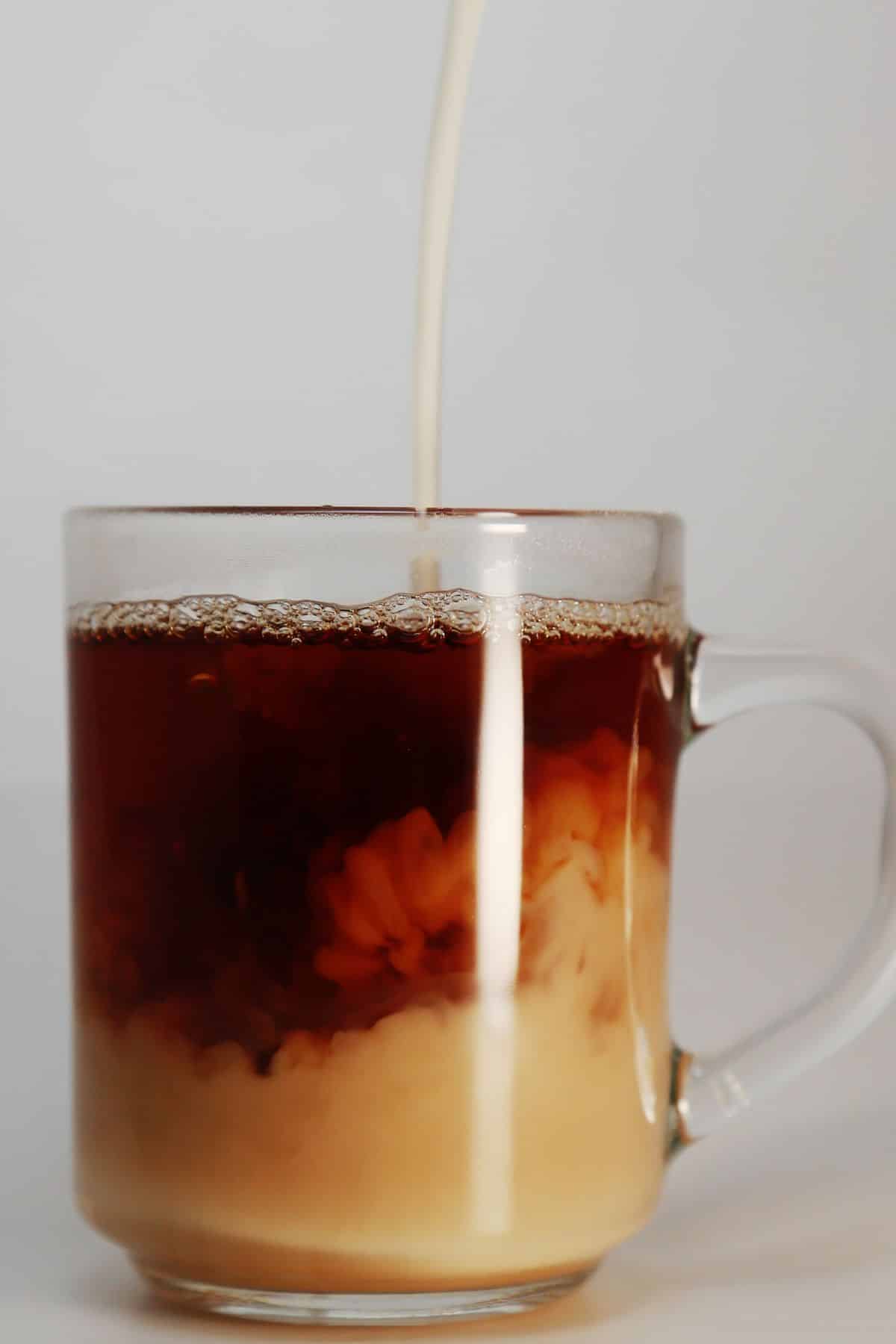
Ingredients and Substitutes
Do you like your coffee black and bitter? Or with a dash of oat milk and a drop of maple syrup? Maybe you prefer a touch of vanilla extract and some almond milk.
No matter how you enjoy your coffee, you can adapt your protein coffee to your individual preferences. Here are some ideas to upgrade your average cup of coffee into an easy protein coffee.
Hot Coffee
Whether you enjoy a rich, single-origin dark roast, or a freshly ground blend with nutty undertones, you can use any brewed coffee in this recipe.
I wouldn’t use cold brew coffee for this recipe, though, as the coffee should be hot to help the collagen dissolve. Cold coffee is not the best way to blend in the protein source.
Just remember that darker roasts don’t contain more caffeine; that’s a myth. Lighter roasts contain a higher concentration of caffeine. Dark roasts are also lower in acids and better for reducing heartburn with coffee (see my list of the best low acid coffee).
You may also wish to use organic coffee to help prevent your exposure to pesticides.
Collagen Powder
Pure collagen powder is tasteless and odorless, but some brands add binders, preservatives, synthetic sweeteners, refined sugar, or artificial colors and flavors.
Try to avoid those and get pure collagen powder instead. It should have one ingredient: collagen peptides and would ideally come from grass-fed cattle. You can also use marine collagen. Always check the ingredient lists or main ingredients on any protein powder or pre-made protein shake.
Skip the whey protein powder or whey protein concentrate and other types of protein powders for this recipe as they will not dissolve nearly as well as collagen protein. If you don’t have collagen protein or you want to use a specific protein powder, then you may need to use a shaker cup or a blender to blend the coffee and the powder.
If you want a flavored protein coffee, you can always use a flavored collagen powder such as vanilla protein powder or chocolate protein powder. However, the powder main not blend as well as plain collagen protein if it has other ingredients in it.
I use the unflavored Equip Foods Collagen Peptides (use code CLEANEATING for 15% off your order)!
Plant Milk or Dairy Creamer
Any type of milk or creamer will work. This is an optional ingredient. For those who enjoy coffee without milk or cream, stick to what you like.
But if you want your brew lighter, feel free to add a dash (or more!) of your favorite plant milk. Oat milk gives it a sweet and delicately creamy taste, and nut milk like unsweetened homemade almond milk will boost the protein content of this drink even more.
I find that roasted almond or light coconut milk work particularly well with most coffee-based drinks. The roasted almond adds depth of flavor, so if you love deep, complex coffee undertones, this will bring it out. Coconut milk or homemade oat milk creamer are both perfect for those who love their coffee extra creamy.
And, of course, you can use regular milk, creamer, or half-and-half if you can tolerate dairy. My husband insists on using half-and-half even though he is mildly lactose intolerant.
Maple Syrup
Sweetener is 100% optional with this recipe; if you decide to add some, it’s up to you which one you use. Maple syrup has a light sweetness and is smoky and flavorful.
If you like honey, agave syrup, stevia, or anything else, feel free to use it. Skip the artificial sweeteners, though.
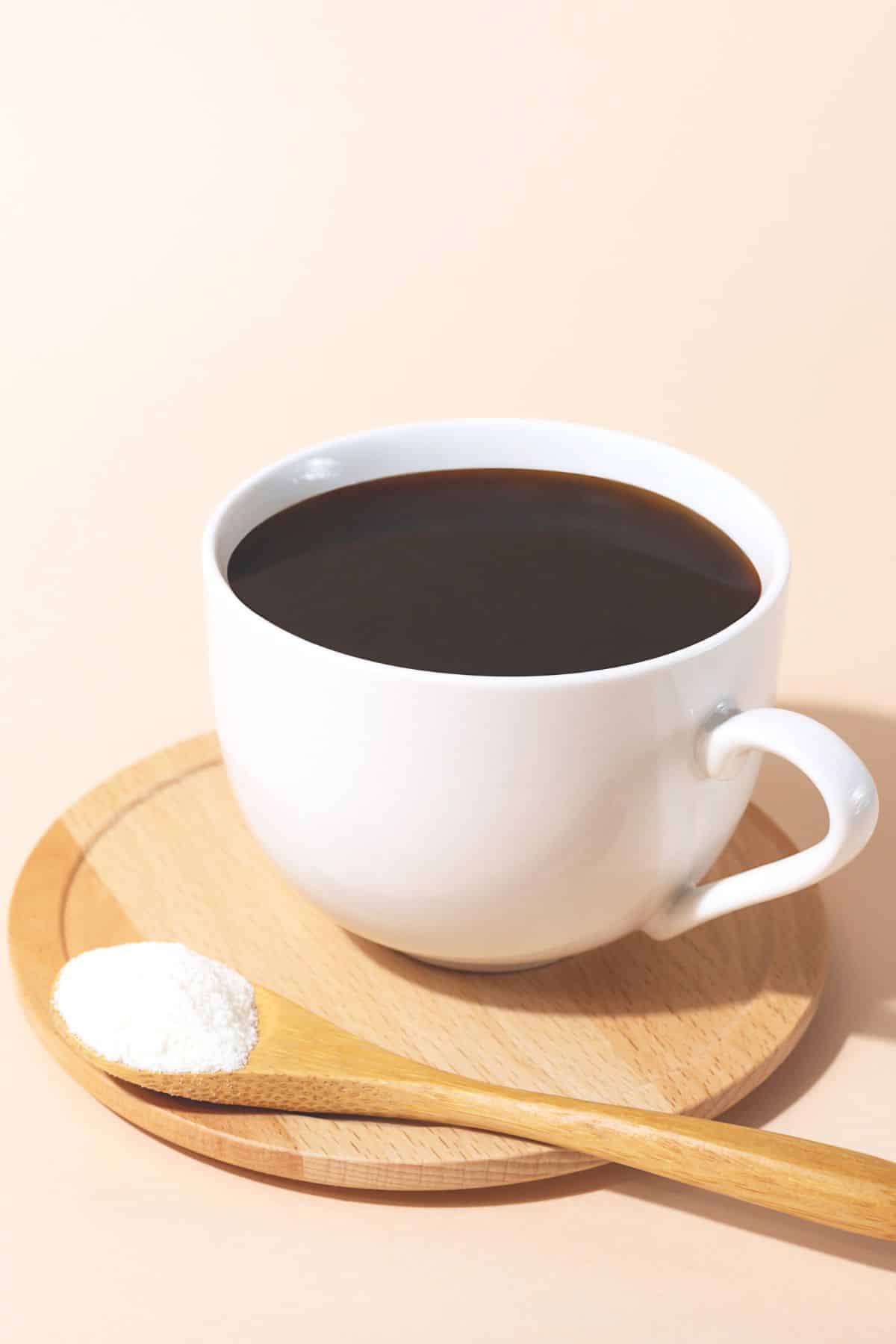
Recipe Tips
- Use decaffeinated coffee if you are sensitive to caffeine, or if you want to drink this later in the day.
- You can use whatever type of sweetener you like in this recipe. Or, if you like your coffee black, just leave it out. See my list of the best sugar-free creamers and non-dairy sugar-free vegan creamers.
- Want another nutrient-dense coffee drink option? Try this Maca Coffee recipe.
- For an iced version, let the coffee cool and serve with ice cubes. This recipe tastes great as an iced coffee protein shake.
Recipe FAQs
Collagen is the most abundant protein found in our bodies. It’s what makes connective tissue and is the building block of muscles, bones, skin, cartilage, and tendons.
No, protein coffee is not a breakfast substitute unless you are fasting for a medical reason. However, it can help you feel full and provide energy, making it an excellent snack. Have something small and healthy with it, for example, a yummy chocolate smoothie bowl, some pumpkin protein bites, or protein overnight oats.
Not at all! If you ordinarily have coffee later in the day, you can have protein coffee instead. It’s a great way to combat the three ‘o clock slump if you struggle with that. However, avoid having coffee later in the day if you’re sensitive to caffeine (or be sure to use organic decaffeinated coffee).
It may help as part of a healthy lifestyle, including clean eating and regular exercise. Caffeine can rev up your metabolism, and protein makes you feel fuller for longer, so both of these ingredients can help with weight loss.
Collagen is tasteless and is an unflavored protein powder. It is unlikely that you will be able to taste it in the coffee, even if you drink it black. The collagen can add a little bit of texture or fullness to the coffee, but it is not very noticeable.
My recipe includes about 14 grams in one serving using Equip Foods Collagen Peptides (use code CLEANEATING for 15% off your order).
More Health Boosts You Might Like
- Tips for Using Collagen Protein
- Iron Rich Smoothie
- Overnight Protein Oats
- Strawberry Protein Smoothie
- Peanut Butter Chia Pudding
Don’t Miss These Coffee Resources!
I hope you make this recipe! If you do, please leave a comment and a starred review below.
And, consider following me on social media so we can stay connected. I’m on Facebook, Pinterest, Instagram, and YouTube!
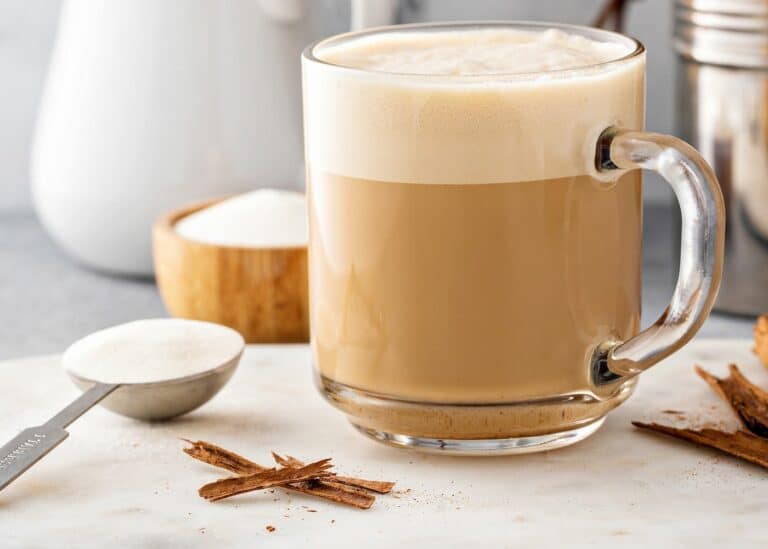
Protein Coffee Recipe (14 Grams of Protein)
Protein Coffee is a great way to start the day. It’s satisfying and helps increase your overall protein intake. You can’t even taste the protein powder in this recipe that can be made with milk or dairy-free.
- Total Time: 4 minutes
- Yield: 1 serving
Ingredients
- 1 scoop of collagen peptides (I use Equip Foods Collagen Peptides; use code CLEANEATING for 15% off your order)
- 8 ounces hot brewed coffee
- 2 tablespoons unsweetened almond milk (use milk or creamer if you aren’t on a dairy-free diet)
- 1 teaspoon maple syrup
- 1/4 teaspoon vanilla extract, optional
Instructions
- Add a scoop of collagen protein to your mug.
- Pour or drip the hot coffee into the mug over the collagen.
- Stir until it’s blended in (it may even dissolve on its own; I usually don’t have to even stir it).
- Add your choice of plant milk, sweetener, and vanilla extract (optional).
- Stir thoroughly and enjoy hot.
Notes
- Use decaffeinated coffee if you are sensitive to caffeine, or if you want to drink this later in the day.
- You can use whatever type of sweetener you like in this recipe. Or, if you like your coffee black, just leave it out.
- Prep Time: 3 minutes
- Cook Time: 1 minute
- Category: Beverage
- Method: No Cook
- Cuisine: Healthy
- Diet: Gluten Free
Nutrition
- Serving Size: 1 full serving of recipe
- Calories: 81
- Sugar: 4 g
- Sodium: 78.8 mg
- Fat: 0.4 g
- Saturated Fat: 0 g
- Carbohydrates: 4.6 g
- Fiber: 0 g
- Protein: 14.1 g
- Cholesterol: 0 mg
Don’t forget to join my newsletter list to get exclusive clean eating recipes and tips. The newsletter is 100% free with no spam; unsubscribe anytime.
About the Author: Carrie Forrest has a master’s degree in public health with a specialty in nutrition and is a certified holistic nutritionist. She is a top wellness and food blogger with over 5 million annual visitors to her site. Carrie has an incredible story of recovery from chronic illness and is passionate about helping other women transform their health. Send her a message through her contact form.
Note: this post is for informational purposes only and is not intended as medical advice. Please consult your healthcare provider for recommendations related to your individual situation.


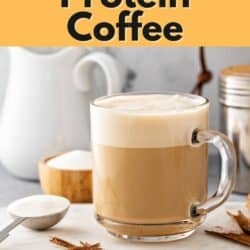
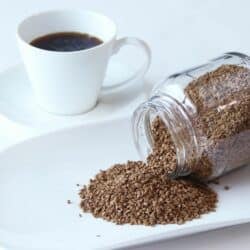
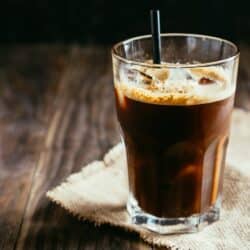
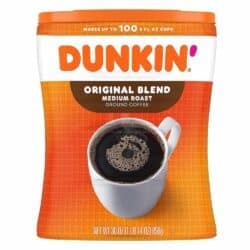



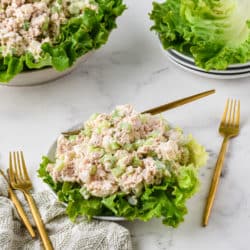


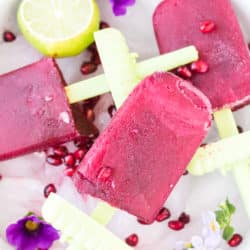








I am wanting to do a pro metabolic eating program and lose weight cannot eat first thing in the morning before coffee can I make this coffee and add MCT oil instead of dairy/plant creamers
Like the benefits of MCT oil in coffee but not wanting to do keto any longer.
Carrie – for clarification, is adding collagen protein to coffee a good way to add a healthy protein to one’s diet (specifically, for me, in the mornings & not break my intermittent fasting?). I have looked at the collagen protein on Amazon that you have suggested. Gosh, I had no idea there was so much to learn about coffee… my primary goal is to lose weight, some “fasting”, but not willing to give up coffee. Thank you…♡ I really need to kick sugar out of my diet too!
Adding collagen protein should not break a fast in terms of kicking you out of a ketosis state. I believe it is a healthy way to add protein to the diet.
One of my healthy morning staples! Tastes great and is a simple upgrade.